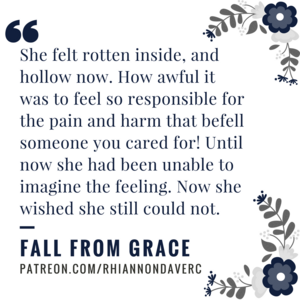FALL
(n.) A descent from one position to another, lower than before
A marked, often sudden, loss of status or importance
(v.) To descend, to plummet
To move downwards at an uncontrollable pace
To be cast down
There was no hiding here, and he knew that. Still, some pathetic part of him crawled under the hedgerows, wishing that the twisted branches would hide his body from view, and that he might lay here forever undisturbed. They scratched at the skin of his arms and chest as he settled beneath them, panting from his run, trying to calm down and be still. If they sent the dogs after him there would be no hiding at all.
He did not allow himself to consider this situation unfair, nor did he attempt to justify what he had done. He knew the rules, and he had broken them, even if he had not intended to. That was what the rules were there for, after all. Instead of dwelling on the fact that he ought not be punished, his mind swam with fear of what punishment he would face.
He was still praying that they would not send the dogs. It was a backwards way of thinking — after all, if he stopped hiding and gave himself up, they would not need to send the dogs — but he could not bring himself to stand up and go back to the men who searched for him. His skin was damp with perspiration, both from the run and from the terror swimming through his veins, and the air now felt cold upon his bare torso. He had not managed to pick up a shirt before he ran. He had not managed to pick up shoes, and along with the other sensations clamouring for his attention he realised that his feet were crying out with pain, bleeding. He should not have run across the fields barefoot — but what else could he do? He could not hold back a whimper as he considered what would happen to him when he was found.
‘Spread out and search the field,’ an authoritative voice called out, what could only have been a couple of hundred feet away. His whole body tensed, his breathing catching in his throat as fear rose like bile in his throat. They would find him soon. There was no avoiding it now. He was barely even hidden, and he knew it.
He tried to remain quiet, but the panic inside him was forcing its way out, pushing strained whimpers into his every out breath. It seemed like an eternity passed while he waited, his eyes rolling wildly in his head, trying to see the first sign of his impending capture.
A figure stepped through the same gap in the hedgerows that he had stepped through only a short while before, and a strangled groan escaped his throat. This was it. The figure — a man of the estate — turned round to look for the source of the noise, and saw him immediately.
‘Griffin,’ he said out loud, though his voice was barely more than a whisper. Quickly he glanced around, then approached the hedge closer.
Griffin stared back at him from his position on the ground, unmoving, his hands desperately clutching at the tiny branches of the hedge as if to pull it over himself completely, his eyes staring a wordless plea. The man checked the area one last time, and then knelt into a crouch beside him.
‘Give me your identification band,’ he said, gesturing to Griffin’s neck, his tone low and urgent. There was something like pity in his face. He was not a young man, and he had seen punishments for this kind of indiscretion before. He had no wish to see another.
Griffin hesitated a moment, frozen in panic, until the man repeated his gesture. Something in his mind clicked on then, and he reached up to take off the shining metal around his neck, untying the leather straps that held it in place. He had worn the identification band since birth, only taking it off for the regular modifications in size as he grew, and his neck felt empty and light without it. A thin circle of pale skin stood out against his tan, a piece of his flesh that had barely tasted sunlight.
The man took the identification band, and hissed a final instruction. ‘Stay there until we’ve gone by. As soon as it’s clear, get out of here and run to the city. Get a fake band, and find yourself employment as far away from here as possible.’
He did not wait to see if Griffin understood or even acknowledged his words; he simply stood and started to stride back towards his companions, waving the identification band aloft.
‘He’s left this under the hedgerows there,’ he was shouting, and as his comrades gathered closer to him his voice lowered in volume. ‘We’ll never get ahold of him now, not without identification. He’ll go to the city and be on a ship within twenty-four hours.’
There was a murmuring of discontented agreement as the other men took in what he said, examining the band and then walking away, back towards the estate. Of course they could readily accept the story, and of course there was no way they would be able to find him now. No one would be able to find him. Without an identity, he may as well not exist.
Laying still under the hedgerow, he tried to breathe and think about what this meant. Perhaps it would be better for him if he were to stand up now and shout and call them back. At least if the punishment killed him he would no longer be aware of anything. Even if the pain was terrible, even if it was excruciating and they kept him alive for days, he would be dead at the end of it, blissfully so. What kind of life was left for him, now? With no identity, he was no one…
A soft groan escaped his lips as a hand encircled his throat, feeling the unfamiliar patch of skin where his band had been for all of his life. This could not be happening. But it was. He had never meant to hurt anyone — in fact, he was pretty sure he had not done so — and he had never meant to get carried away. It had all just happened, as simply and quietly as breathing, and it was not as if anyone had protested at the time. She certainly had not. She had wanted it as much as he had, if not more since she was educated and knew what she was doing.
Her. That was the one thing his mind had stayed away from so far, through the running and the hiding and even now, through the indecision. But at last he had to think of her: she was the reason for this situation (not the reason, not the reason, you can’t blame her for any of this), so it was natural that he should turn back to thinking of her. More than that; she was the person he was going to miss, the person above anyone else that he would run back to the estate for, just to see her again. She probably knew that. He wondered if she knew what had happened to him yet.
He shivered; the day was drawing colder. It was only an hour or so until sundown, and if he was caught out here at night it would be bad for him. No shirt, no shoes… he could freeze to death on a night like this one promised to be, cloudless sky letting the heat escape, wind stirring through trees that already knew Autumn had arrived. With some effort he dragged himself out from under his hedgerow, and sat up with his back against it, surveying the horizon.
He had never been to the city on his own. It was a daunting idea, and he had neither money nor belongings to barter. He would have to trade work for a place to stay, even tonight, and food was a whole other matter. He began to brush the dirt off his arms, reaching behind himself to ineffectually attempt to clear it off his back, wincing a little at the sight of blood across his arms and chest where the sharp, spiky branches had cut into him. He looked an untrustworthy sight, he knew — muddy and bloodied, clad only in a pair of simple work trousers, his sandy hair dishevelled and falling across his face. But what could he do? All he had to work with was himself, and if that was not good enough then there was no alternative.
He got to his feet, slowly, and glanced behind him at where he had come from. The field behind him was empty. He did not know whether to breathe a sigh of relief, or disappointment. With an aching and heavy heart, he began to walk towards the city.
She sat in front of the vanity mirror in her bedroom, staring dully at the self reflected there, holding the right-hand strap of her dress onto her shoulder. She had been dressing, preparing to go to dinner as she did every evening, but somehow she had paused, unable to bring herself to do the dress up at the back. She felt rotten inside, and hollow now. How awful it was to feel so responsible for the pain and harm that befell someone you cared for! Until now she had been unable to imagine the feeling. Now she wished she still could not.
Her face felt stiff and strange from the tears that had poured down it, and the redness around her eyes matched the red marks on her cheeks and nose. She always seemed to swell up and redden when she cried, as if she was allergic to sadness. Imagine that! It probably made no difference whether or not you were allergic to an emotion; you would most likely feel it just the same.
She knew that she was required to attend the dinner service, as a lady of the house. Of course she knew that — it was not as if breaking the rules once could make her forget all of the others. Still, it seemed pointless, an impossible task that would achieve nothing. She was already out of favour, and attending dinner seemed unlikely to have any impact on that.
Her mind wandered back as she sat, replaying the scenes that had led to this point. Her first contact with Griffin a few years ago — strange how they could grow up on the same estate and yet not meet for so long — her kept inside reading and learning whilst he worked outdoors. She remembered even then the kindness and gentleness he had shown her, the way his rough hands carefully held onto hers, and the way that he had allowed her to wrap and clean a wound without flinching even though it must have hurt him greatly. It seemed a world ago; it seemed like yesterday.
Of course such a friendship could only grow, though it had not ever occurred to her that they had been kept apart for a reason.
And last night, at the conclusion of it all, his body over hers, the sweet warmth of his kisses as his hands entwined in her hair… and how could she look her father in the eye and tell him that she had been the one to initiate it? That they had been meeting in secret for months, under the pretence of reading lessons, bettering him so that he would be more suitable for her, touching the colour on his identity band that signified ‘servant’ and wishing she could scrub it off?
Finally she stirred, and finished dressing. This was important. If she said nothing, he would be punished, and it was all her fault in the first place. At the very least, she would suffer alongside him if she had to.
Arriving at the dinner table, she discovered a room of stony silence. She looked for her place at her father’s left hand, opposite her mother, but the place was not set. In hurried confusion for a moment she looked around, not understanding, and then the shadowed eyes of her father lifted towards her with a flashing glare.
‘Your place is no longer here,’ he pronounced, his words clipped with steel. ‘If you want to be a servant so much, I will grant you that wish. Do not look for your boy. He has run and left his identity behind. You will take his place.’
A sob caught in her throat; her father's guards lifted her by the arms to take her to the servants’ quarters, and the warm familiar band around her neck was replaced by something cold and new. All she could think about was the helpless boy adrift in the city, a No One, made to leave his comfortable life at the estate for uncertainty and hardship. Not by her father. Not by the guards.
By her.











Comments (0)
See all